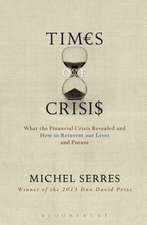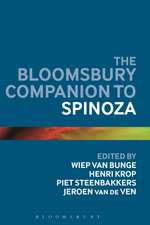Lines of Flight: For Another World of Possibilities
Autor Felix Guattari Traducere de Dr Andrew Goffeyen Limba Engleză Hardback – 16 dec 2015
Preț: 249.17 lei
Preț vechi: 386.60 lei
-36% Nou
Puncte Express: 374
Preț estimativ în valută:
47.70€ • 49.58$ • 39.55£
47.70€ • 49.58$ • 39.55£
Carte tipărită la comandă
Livrare economică 06-20 februarie 25
Preluare comenzi: 021 569.72.76
Specificații
ISBN-13: 9781472507358
ISBN-10: 1472507355
Pagini: 304
Dimensiuni: 129 x 198 x 30 mm
Greutate: 0.43 kg
Editura: Bloomsbury Publishing
Colecția Bloomsbury Academic
Locul publicării:London, United Kingdom
ISBN-10: 1472507355
Pagini: 304
Dimensiuni: 129 x 198 x 30 mm
Greutate: 0.43 kg
Editura: Bloomsbury Publishing
Colecția Bloomsbury Academic
Locul publicării:London, United Kingdom
Caracteristici
Detailed analysis of Felix Guattari's ideas about semiotisation in relation to his work with Deleuze
Notă biografică
Felix Guattari (1930-1992) was a French psychoanalyst, philosopher, social theorist and radical activist. He is best known for his collaborative work with Gilles Deleuze.Andrew Goffey is Associate Professor in the School of Cultures, Languages, and Area Studies and the Director of the Centre for Critical Theory at the University of Nottingham, UK.
Cuprins
Introduction by the Translator \ Foreword \ Part I: Semiotic Subjection and Collective Facilities \ 1. The Unconscious is not structured like a language \ 2. Where do collective facilities start, and where do they end? \ 3. The capitalist revolution \ 4. The bourgeoisie and capitalist flows \ 5. A semiotic optional matter \ 6. The apparatus of power and the facades of politics \ 7. A molecular revolution \ 8. The rhizome of collective assemblages \ 9. Microfascism \ 10. Self-management and the politics of desire \ Part II: The Pragmatic Analysis of the Social Unconscious \ 11. Introduction of the principal themes \ 12. Pragmatics, the runt of linguistics \ 13. Pragmatics as the micropolitics of linguistic formations \ Part III: An Example of a Pragmatic Component: Faciality Traits \ 14. On faciality \ 15. The hierarchy of behaviour in man and animal \ 16. The semiotics of a blade of grass \ 17. The little phrase in Vinteuil's sonata
Recenzii
[This book] invigoratingly suggests 'another world of possibilities' when it comes to considering the most pressing issues and growing tensions facing us today.
Guattari's final book deftly wields the double-edged blade honed in his prior works, cutting in two directions at once through the grand histories of capitalism. It boldly enlarges the analysis of language into an expanded empiricism that addresses the multiplicity of modes implicit in collective equipment, and zooms in on the historical miniaturization of subjectifying processes. Guattari thus succeeds in showing how media and urbanization function at the heart of capital, while speaking pragmatically to the invention of collective assemblages. Andrew Goffey's translation and introduction beautifully capture both the ambitious sweep and the micropolitical acuity of Guattari's genealogy of Capital.
Guattari's elaboration of a critical semiotic model, exposing types of 'collective equipment' that fabricate individuals under different historical conditions, enriches our understanding of his analyses of capitalism, revolutionary politics, and the social unconscious. Guattari's lines of flight from the insides of structural Marxism, psychoanalysis and linguistics carry them into unfamiliar territories and acquaint us with marvellous outsides. Written in his idiosyncratic vocabulary, Guattari's restless search for novel 'optional matters' with which to initiate micro-revolutionary changes exhorts us engage in multi-scalar militancy. Reading Guattari without Deleuze is a highly recommended line of flight.
Lines of Flight carries the reader on a compelling journey across the full range of the many-dimensioned thinking of one of the 20th-century's most original minds. The key concepts animating Guattari's thought reconstellate around the central question, all the more burning today, of the complex nature of capitalist power and how it may harbor, at the very heart of its own operations, the seeds of possible worlds beyond it. Lines of Flight is essential reading for newcomers to Guattari's work and for experts alike.
Guattari's final book deftly wields the double-edged blade honed in his prior works, cutting in two directions at once through the grand histories of capitalism. It boldly enlarges the analysis of language into an expanded empiricism that addresses the multiplicity of modes implicit in collective equipment, and zooms in on the historical miniaturization of subjectifying processes. Guattari thus succeeds in showing how media and urbanization function at the heart of capital, while speaking pragmatically to the invention of collective assemblages. Andrew Goffey's translation and introduction beautifully capture both the ambitious sweep and the micropolitical acuity of Guattari's genealogy of Capital.
Guattari's elaboration of a critical semiotic model, exposing types of 'collective equipment' that fabricate individuals under different historical conditions, enriches our understanding of his analyses of capitalism, revolutionary politics, and the social unconscious. Guattari's lines of flight from the insides of structural Marxism, psychoanalysis and linguistics carry them into unfamiliar territories and acquaint us with marvellous outsides. Written in his idiosyncratic vocabulary, Guattari's restless search for novel 'optional matters' with which to initiate micro-revolutionary changes exhorts us engage in multi-scalar militancy. Reading Guattari without Deleuze is a highly recommended line of flight.
Lines of Flight carries the reader on a compelling journey across the full range of the many-dimensioned thinking of one of the 20th-century's most original minds. The key concepts animating Guattari's thought reconstellate around the central question, all the more burning today, of the complex nature of capitalist power and how it may harbor, at the very heart of its own operations, the seeds of possible worlds beyond it. Lines of Flight is essential reading for newcomers to Guattari's work and for experts alike.















